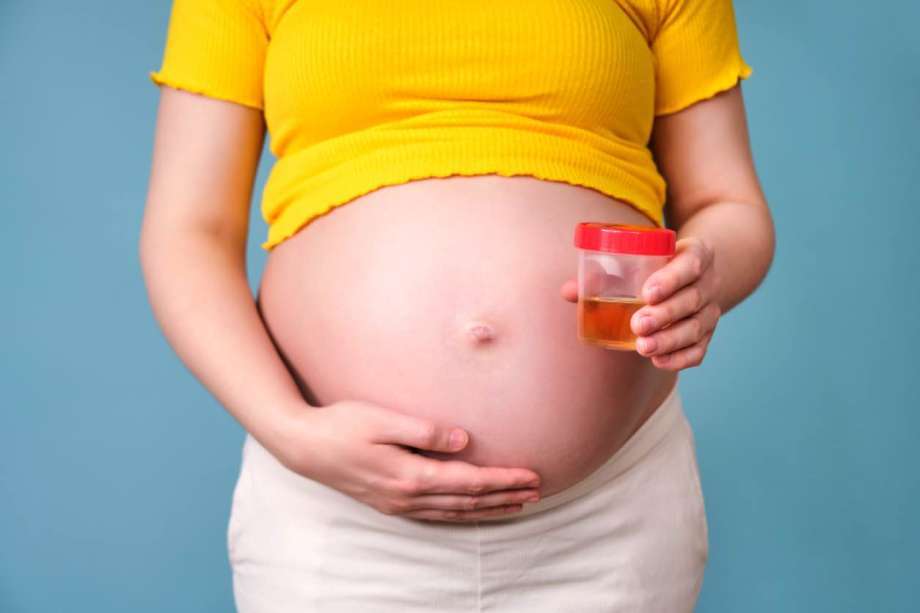Protein in Urine During Pregnancy: What to Know About Proteinuria

A urine test is a common part of prenatal visits. One of the things your doctor will test for is proteinuria or protein in your urine.
Protein in urine during pregnancy can be a sign of a number of different conditions. Some of these conditions, like dehydration, are minor, while others, like preeclampsia, can be quite serious.
Find out more about the causes of proteinuria in pregnancy, how to detect it, and potential symptoms and side effects.
Related: Risks of Multiple Pregnancy: High Blood Pressure
What Does Protein in Urine During Pregnancy Mean?
The kidneys clean the blood by filtering out waste products from the metabolism of nutrients (National Health Service, 2006). These waste products become urine.
When a person becomes pregnant, their blood volume increases. This means that the kidneys have to work harder to filter out toxins and waste products. Sometimes, in the process, extra protein slips through into the urine (Erickson, 2023).
Trace amounts of protein in the urine during pregnancy are normal and generally of no concern (Erickson, 2023).
However, higher levels of protein can be a sign of numerous health conditions that can affect you, your pregnancy, and your baby.
How to Detect Protein in Urine During Pregnancy
Checking urine for protein is pretty straightforward.
First, your healthcare provider will take a urine sample when you come in for your regular checkups. They will use a dipstick test to check for protein and other things in your urine. The dipstick test will let your doctor know if your body is excreting protein, and if so, how much.
How Proteinuria is Measured
The dipstick gives fives levels of protein in your urine (Erickson, 2023):
- Trace: Trace levels of protein mean just a tiny bit. Trace levels of protein in the urine are generally nothing to worry about, especially in early pregnancy.
- +1: If your protein levels are +1, your doctor may show more concern at this point. They may take another blood pressure measurement, and keep an eye open for symptoms of preeclampsia. You may want to have your provider order blood tests.
- +2 and +3: These readings indicate moderate to high levels of proteinuria. If you have a +2 or +3 reading, your healthcare provider may order additional tests.
- +4: 4 is as high as the scale goes. If the protein in your urine measures +4, your doctor may send you to the hospital for additional care.
What is Preeclampsia?
Preeclampsia is the presence of new high blood pressure, plus at least one other associated symptom (Herndon, 2021), including:
- Protein in the urine
- Low platelet count
- Impaired liver function
- Impaired kidney function
Preeclampsia can progress to eclampsia, which results in seizures and can cause the death of the mother and/or baby.
Preeclampsia usually occurs after 20 weeks of pregnancy. Occasionally it occurs earlier than that. Sometimes it may develop postpartum.
What are the Symptoms of Preeclampsia?
Platelet count, protein in the urine, and liver and kidney function can only be determined by laboratory tests. But there are other symptoms of preeclampsia that you might notice yourself. These include:
- Upper abdominal pain
- Swelling in your hands or face
- Severe headaches that won’t go away
- Sudden weight gain
- Shortness of breath
- Nausea or vomiting
- Vision changes (blurry vision, seeing spots)
If you experience any of these symptoms, it’s important to speak to your healthcare practitioner as soon as possible.
What Level of Protein in Urine Is Preeclampsia?
High levels of protein in the urine are one sign of preeclampsia. However, it’s not the only determining factor. The term “preeclampsia” means new high blood pressure combined with high levels of protein in the urine and/or the other symptoms described above (Herndon, 2021).
Treatment for Preeclampsia

Before the 37th week of pregnancy, treatment for preeclampsia is often bed rest. Your doctor may also prescribe medication to prevent seizures.
It’s possible your doctor may want you to go to the hospital for advanced monitoring. At the hospital, you may be given IV (intravenous) blood pressure medication.
You might also receive steroid injections to help your baby’s lungs develop more quickly, so that, if necessary, your baby will be better prepared for an early delivery.
After 37 weeks, if your baby is gestationally mature enough, your obstetrician may want to deliver the baby and placenta early.
Symptoms of preeclampsia generally go away within 48 hours following delivery. However, postpartum preeclampsia typically develops between 48 hours and six weeks after delivery, so if you have preeclampsia symptoms after your baby is born, it’s important to contact your doctor immediately.
Who is at Risk for Preeclampsia?
Preeclampsia can happen to anyone, and it’s nobody’s fault. However, certain preexisting health conditions can make preeclampsia more likely. Risk factors include:
- Genetics
- Family history of preeclampsia
- Certain autoimmune disorders, such as Lupus
- Blood vessel issues
- Advanced maternal age (being over 40)
- First-time pregnancy
- Having had preeclampsia with a former pregnancy
- Being pregnant with multiple babies (like twins or triplets)
- Obesity
- Existing high blood pressure (chronic hypertension)
- Becoming pregnant by in-vitro fertilization (IVF)
- Having diabetes
- History of sickle cell disease
- Existing kidney disease
Following your doctor’s instructions during this, or any high-risk pregnancy, can help to minimize the likelihood of pregnancy complications.
Preeclampsia and Future Health Risks
There is evidence that having had preeclampsia may increase a person’s risk of health complications in the future, including heart failure, coronary heart disease, and, in some cases, stroke (Wu et ali., 2017).
Does Protein in Urine Always Mean Preeclampsia?
No.
Preeclampsia is only one possible cause of proteinuria.
The important things to think about are, where are you in your pregnancy and the amount of protein in your urine.
Preeclampsia is only one of the possible causes of proteinuria. There are many others (O’Connell, 2018), including:
- Dehydration
- Urinary tract infection (UTI)
- High blood pressure
- Diabetes
- Kidney Disease
- Certain autoimmune diseases such as Lupus
- Heavy metal poisoning
- Congestive heart failure
- And others
It might sound frightening but think of it this way: protein in the urine can be an early warning that can help your doctor to help you to prevent more serious problems.
Other Causes of Proteinuria in Pregnancy

Many things can cause your kidneys to excrete protein into the urine, some are harmless while others indicate more serious pregnancy conditions.
Early Pregnancy
In early pregnancy, before 20 weeks of gestation or so, proteinuria sometimes indicates dehydration.
It can also indicate a UTI (urinary tract infection). This is a minor infection that your doctor may treat with oral antibiotics. Pregnant women are more prone to UTIs. It’s especially important to treat a UTI during pregnancy, as it can move to your kidneys and trigger preterm labor.
Protein in urine during early pregnancy can also indicate more serious conditions such as diabetes, lupus, impaired kidney function, or kidney disease.
After 20 Weeks of Pregnancy
In the third trimester, protein in the urine can be concerning.
If you have protein in your urine after 20 weeks of gestation, your doctor may order blood tests in order to examine your platelets, liver function, and kidney function.
You may also be asked to do a 24-hour urine collection, that is, collecting your urine for 24 hours to see how much protein has been excreted in that period.
What is HELLP Syndrome?
HELLP Syndrome is a variant of severe pre-eclampsia, and it’s life-threatening. HELLP stands for hemolysis (rupturing of red blood cells), elevated liver enzymes, and low platelet count.
Symptoms may include:
- Fatigue
- Headaches
- Edema (retaining fluid)
- Swelling, especially of face and hands
- Nausea
- Upper right abdominal pain
- Chest pain
- Shoulder pain when breathing deeply
- Blurry vision or other vision changes
- Nosebleeds
- Shortness of breath
- Seizures
HELLP can be difficult to diagnose, as some of the hallmark symptoms of pre-eclampsia, such as high blood pressure and protein in the urine, may not be present. Some of its symptoms may be mistaken for flu, gastritis, or gallbladder problems.
Left untreated, HELLP Syndrome can result in liver rupture, placental abruption, blood clots and stroke, respiratory failure, and death.
Will Drinking Water Reduce Protein in Urine?
Drinking water will dilute your urine, but it won’t stop your body from shedding protein.
In cases where proteinuria is due to dehydration, drinking water will help with dehydration. But when proteinuria is due to a different condition, drinking excessive amounts of water won’t cure it.
Don’t drink a lot of water before your dipstick test in order to get a lower protein reading. This will only mask the symptom, which means that whatever is wrong will go untreated. And this can be dangerous for both you and your baby.
If your doctor finds protein in your urine, it’s essential to follow their instructions carefully.
What is the Treatment for Protein in Urine During Pregnancy?
Labor and delivery nurse Hilary Erickson says (Erickson, 2023), “It’s not the actual protein that’s the problem.”
Rather, the problem is the underlying condition that is causing your body to shed protein. Once your doctor determines the cause of your proteinuria—dehydration, a UTI, diabetes, kidney disease, preeclampsia, or another cause—they will treat those underlying health conditions.
Many things can cause proteinuria, and some of them, like preeclampsia, are understandably frightening.
For this reason, it’s important to go to each and every prenatal visit, to take the tests your doctor orders, and to follow your doctor’s instructions to the letter.

